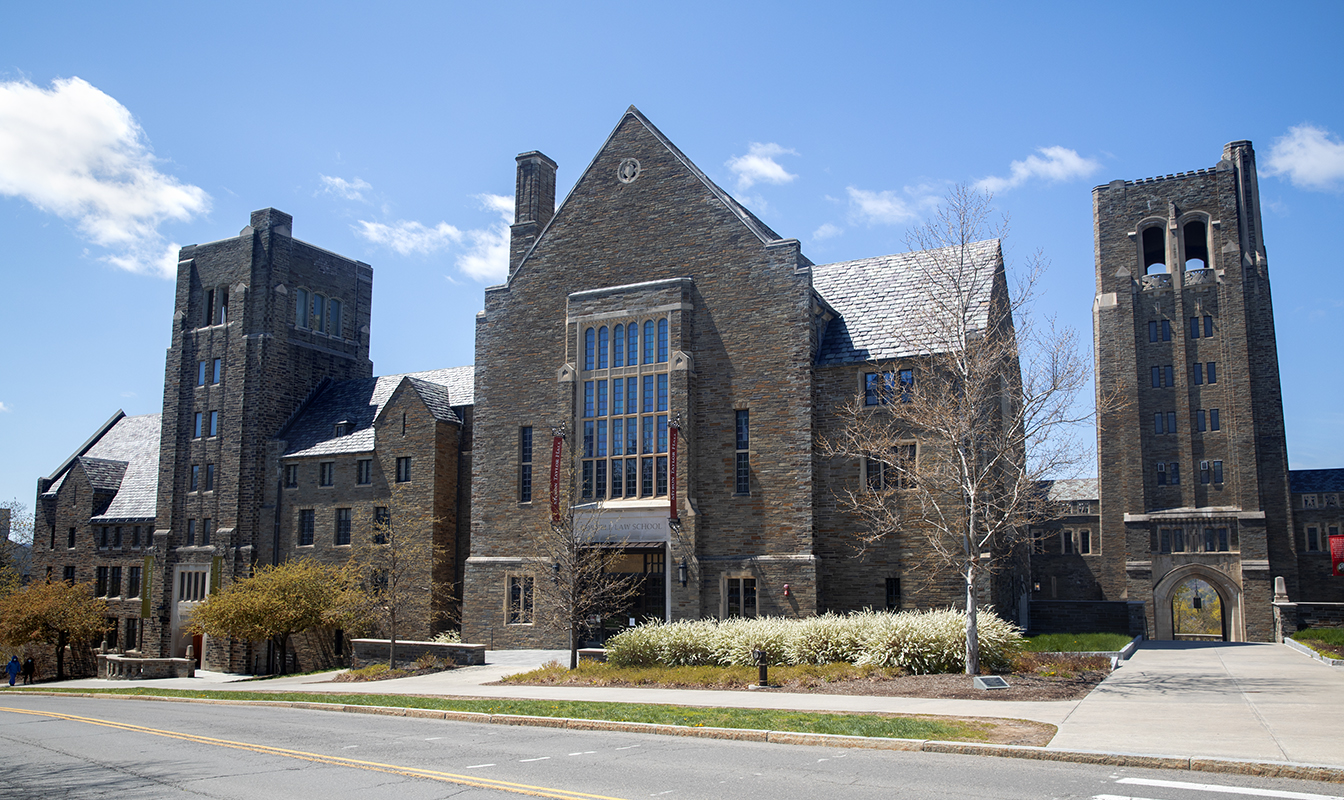
An annual report like this one cannot possibly capture the scope of all our small group does to maintain a reliable online resource at law.cornell.edu, which tens of millions of people use each year, much less detail the various research initiatives and administrative solutions we explore to ensure future stability in uncertain times. Our Annual Report for Fiscal Year 2025, then, focuses on a handful of major projects, outlines how our efforts and expertise create meaningful results, and concludes with a discussion of our accomplishments in staffing and funding our work for years to come.
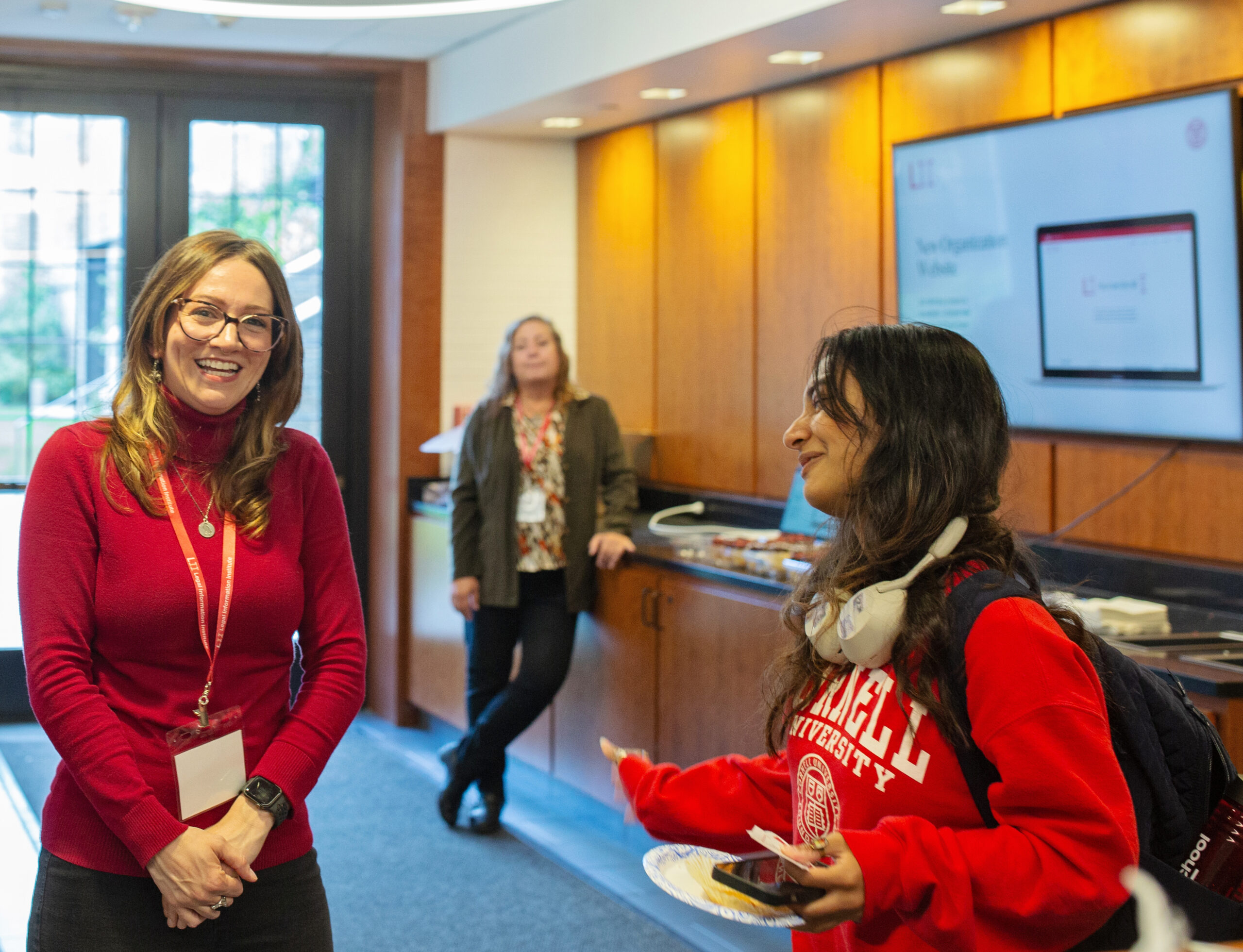
Original Content Collections
Wex:
Around 50 Cornell students and recent graduates contributed to Wex, LII’s online legal encyclopedia, in Fiscal 25. Under Nichole McCarthy’s supervision, they participated in various initiatives, mostly the Wex Definitions Team and the Wex Quality Assurance Team. These students reviewed and improved over 1,000 Wex entries this year and created more than 80 new entries. Changes in the law forced modifications to entries such as Chevron deference and the Fourteenth Amendment, while emerging intersections of law and technology led to entirely new articles on topics such as blockchain and cryptocurrency.
The Cornell Law School Securities Law Clinic, under the guidance of Professor Birgitta K. Siegel, improved and created 13 new securities law definitions. Examples include entries for Regulation Best Interest (Reg BI), blue-chip stocks, Howey test, and Special Purpose Acquisition Company (SPAC).
As we continue to grow and improve this collection, we are hopeful for more collaborations and partnerships across clinics and schools across Cornell University.
Gender Justice Collection:
As part of a consolidation and reorganization, Nichole also assumed responsibility for the Women & Justice Collection that LII inherited many years ago from the Avon Center. After re-naming it the Gender Justice Collection, Nichole embarked on an ambitious campaign to add more U.S. content to what has always been primarily a database of international materials. Using both undergraduates and law students, the collection began an ambitious 50-state survey of gender justice issues.
The international focus has not suffered, though. Employing around two-dozen JD and LLM students in FY25, Nichole supervised the addition or revision of more than 350 resources in the collection, including new resources for Australia, China, Germany, and the Dominican Republic.
The collection has also grown with the recent addition of two new topics: education rights and technology-facilitated gender-based violence (TFGBV). Education rights focus on access to and equality in education, including legal protections against gender-based discrimination, sexual harassment in schools, and policies ensuring the inclusion of girls, pregnant students, and gender-expansive individuals. Technology-facilitated gender-based violence (TFGBV) includes online harassment, non-consensual sharing of intimate images or videos – also referred to as revenge porn, deepfakes, cyberstalking, and other forms of digital harassment and abuse. Legal resources in this collection will address regulations, criminal sanctions, digital platform responsibilities, and survivor support.
Website Upgrades
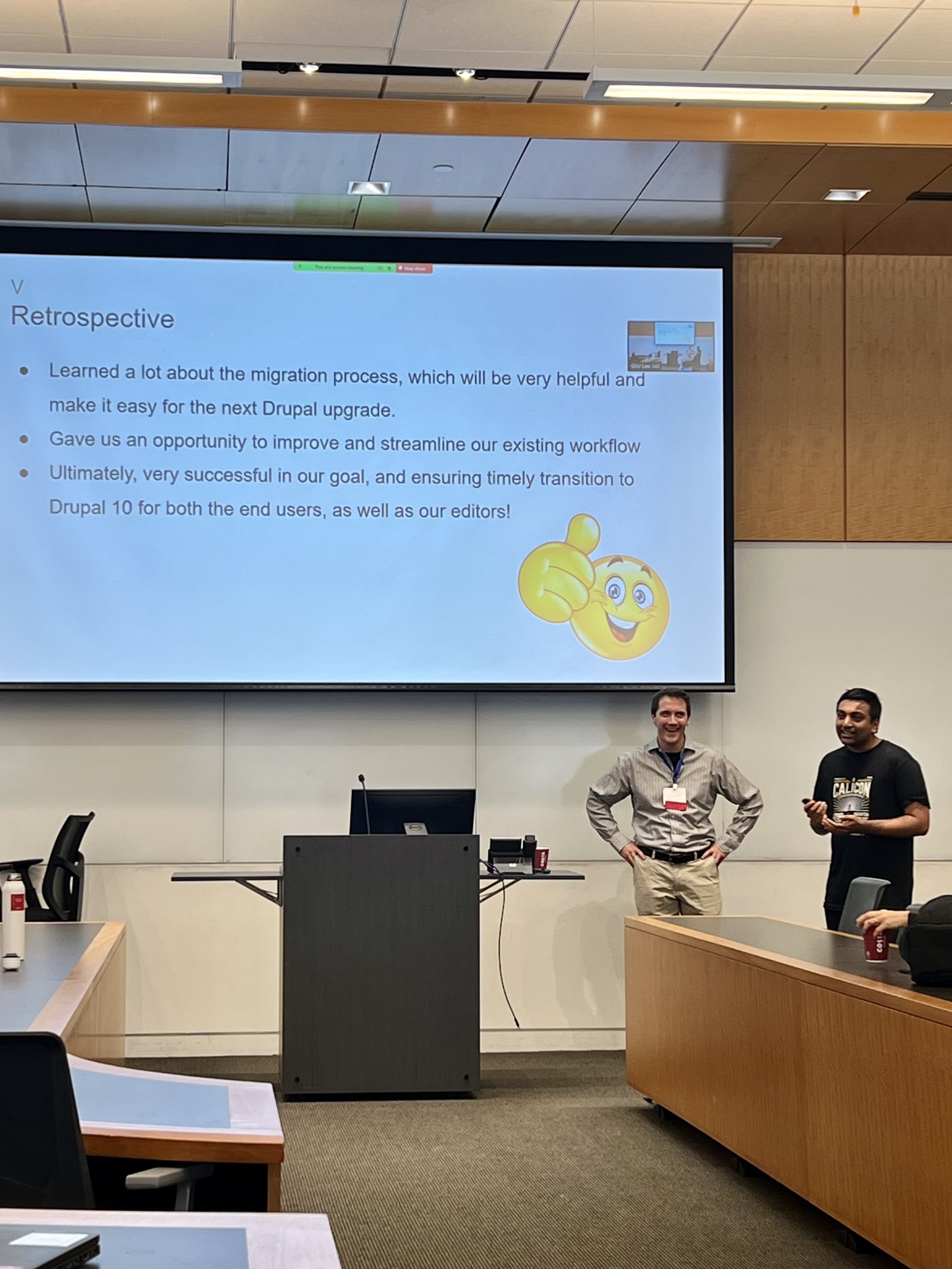
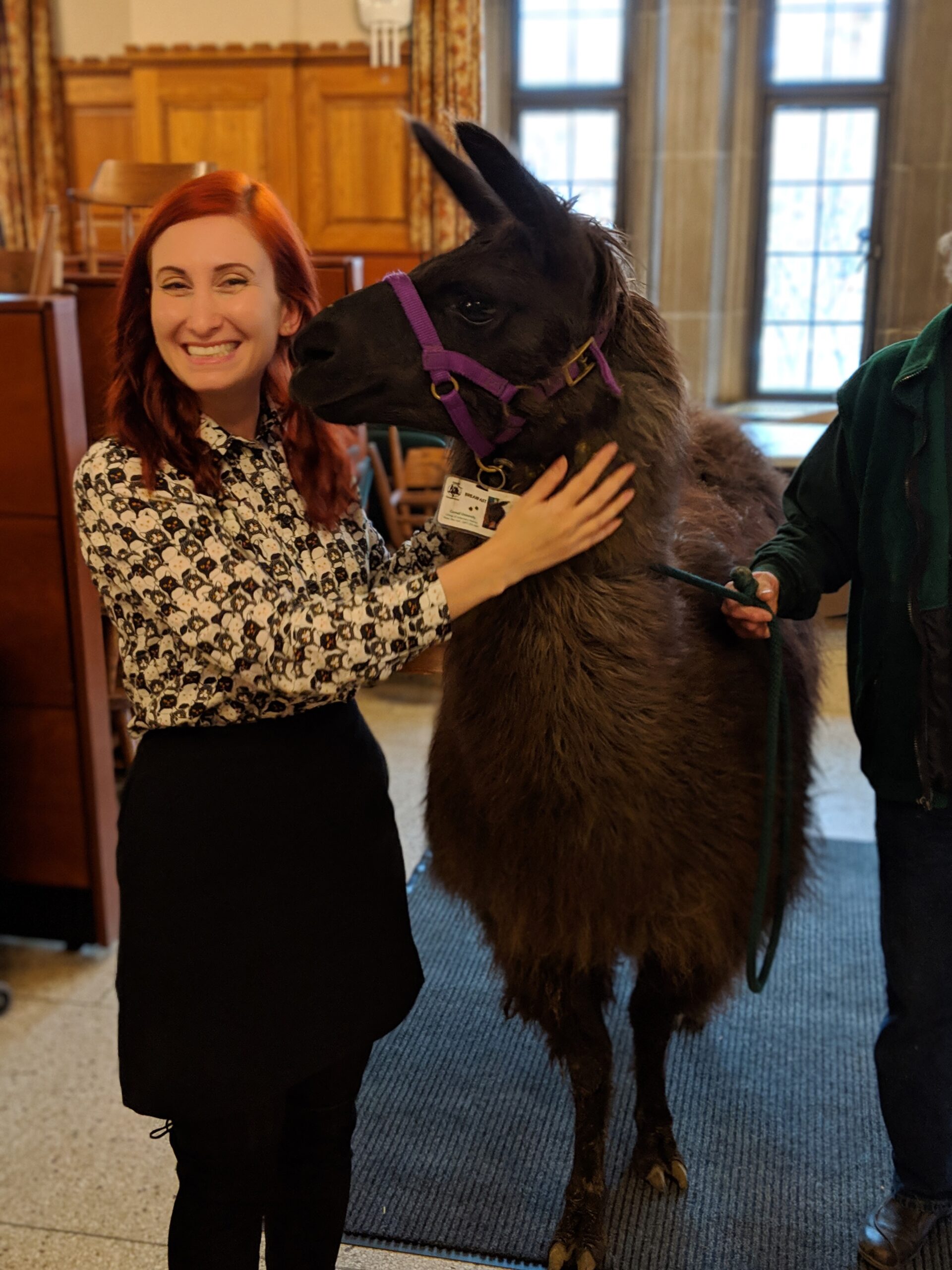
Content Management System & Server Upgrades
In order for new content to reach its audience on the LII website and beyond, the LII engineering team works in the background to ensure that our Content Management System (CMS) remains secure, usable, and reliable. This year, the engineering team completed the significant but extremely unglamorous project of bringing a major CMS upgrade to completion. This upgrade presented such a challenge that the need for it in units across campus merited mention as a University-wide technical debt problem by Cornell’s Chief Global Information Officer Dr. Curt Cole in his October Emerging Tech Dialogue presentation to University IT staff members. The timely execution of the upgrade, which came with an immovable January 5, 2025 deadline, without major disruption to the public was a major achievement for our team, especially DevOps engineer Eric Gullufsen and developer Vivek Kumar. Eric and Vivek gave a presentation at the annual Center for Computer Assisted Legal Instruction (CALI) Conference in which they shared their lessons learned with law school technology specialists from across the country.
Eric was also primarily responsible for performing upgrades to all of LII’s servers in time to meet another immovable external deadline, this one at the end of May. This task required upgrades or alterations to LII software to ensure continuity of all of our services, much of which was addressed by Vivek. Both the Drupal upgrade and server upgrades came with copious amounts of checking, testing, fine-tuning, and then re-checking and testing some more. Nichole McCarthy and Valarie Kimber were especially helpful (and patient) in making sure that processes for editing content in our collections of original materials were either unchanged or that changes to procedures were properly documented so that student authorship on our website could continue without disruption.
About Pages
Neli Karabelova finished a long-time passion project of hers: creating a new “About Us” subsite. After selecting a vendor, creating templates, working with University and Law School branding and communications professionals to get everything approved, mapping re-direct links, migrating “evergreen” content from our existing collection of “About” pages, and coordinating the creation of new content where needed, Neli launched https://about.law.cornell.edu/ toward the end of Calendar 2024.
Just weeks after the About Us site went live, Neli announced that she’d been hired as the first brand manager at Cornell’s College of Engineering. She moved across the street from Myron Taylor to start her new job in late January of 2025.
During her time with us, Neli completely overhauled LII’s brand identity by first bringing more images and graphics to our communications, then managing a brand renew and refresh before tackling these new About Pages as her final major project.
Applied Research & Innovation
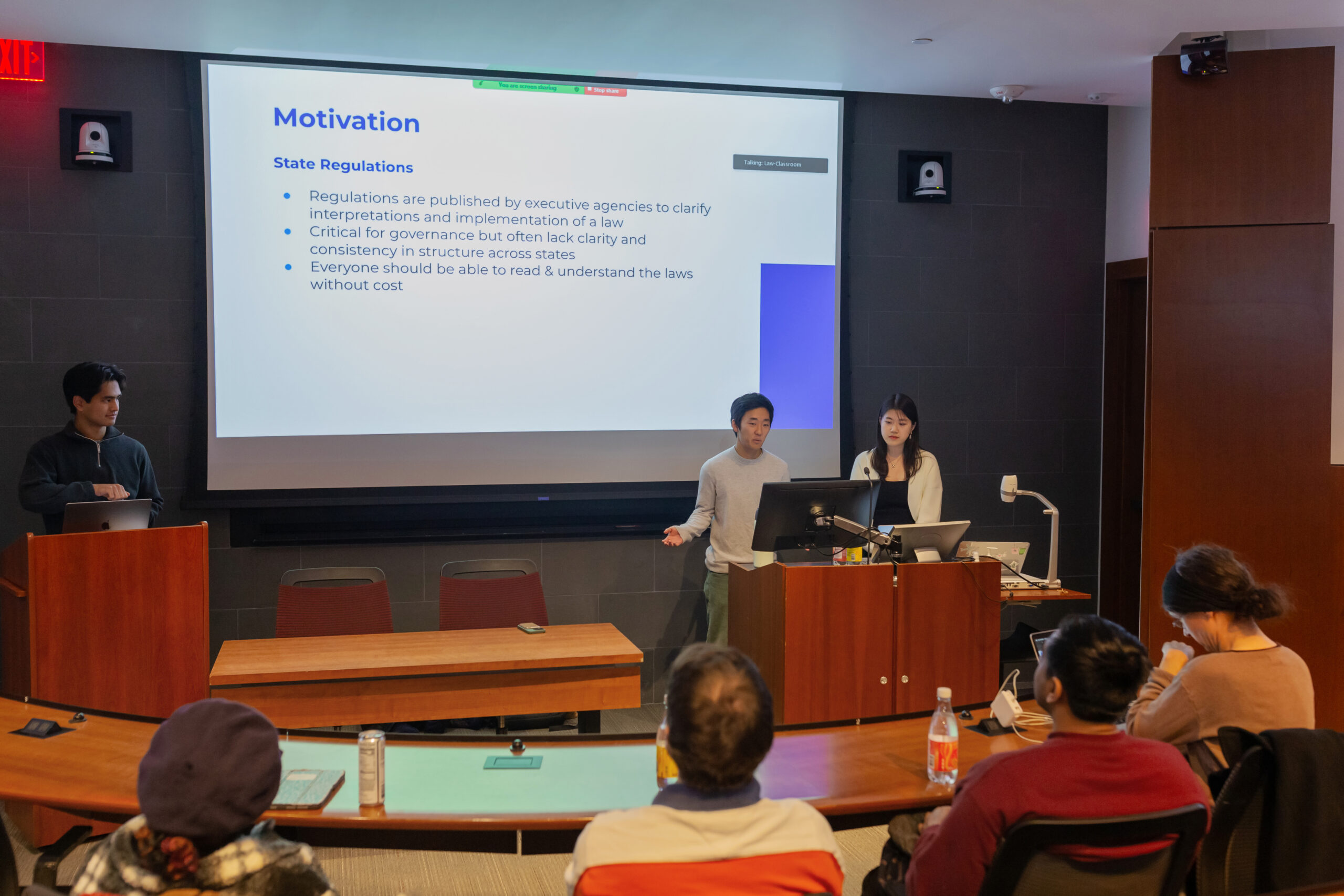
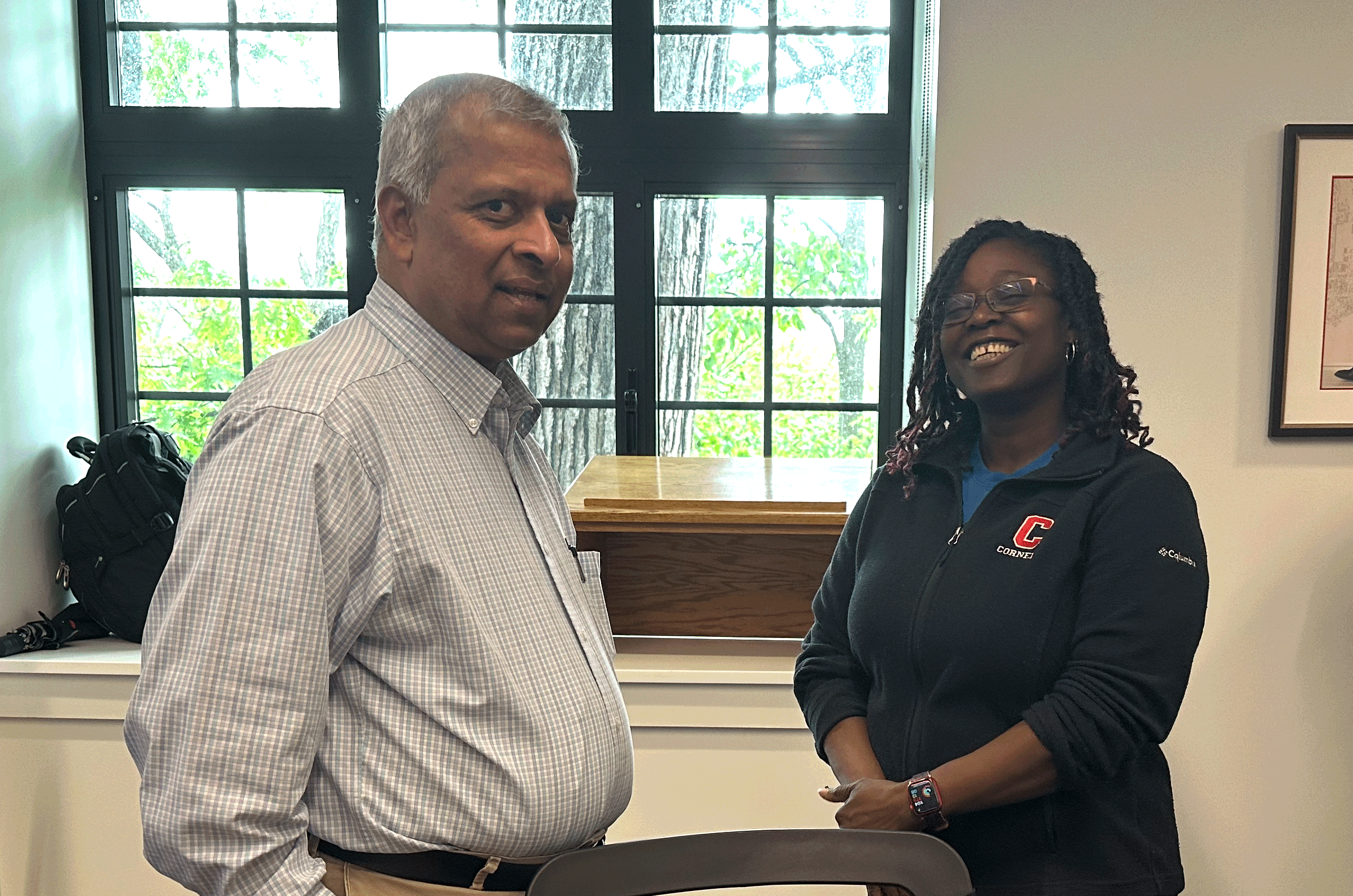
Masters of Engineering (MEng):
As during the many years since she worked with us while a student, LII’s Language & Data Scientist Dr. Sylvia Kwakye once again oversaw the work of Masters of Engineering (M.Eng.) students in both semesters. With an assist from developer Matt Carey, JD in the fall semester, the project focused on regulatory drafting, identifying the “purpose” sections in state regulations and extracting information from them to characterize, categorize, and compare regulations across multiple states. In the spring semester, M.Eng. student Allen Wang designed and presented a proof-of-concept AI-powered vector search to improve the relevance of results returned to users of our website.
LII was pleased to add a second student project in the spring semester, this one by Rutgers Ph.D. student Mani Subramanian Krishnamurthy. A long-time admirer of LII, Mani researched and presented a project using an Large Language Model to automate the formalization of state regulations pertaining to public benefits.
Tom Bruce Legal Innovation Fellow:

LII was delighted this year to welcome Professor Udayan Das as our inaugural Tom Bruce Legal Innovation Fellow. The Fellowship, established in honor of LII’s co-founder, supports LII’s innovation initiatives, collaborating with LII’s core staff as we bring to bear a constantly-unfolding set of technologies to the information problems of a public that has come to rely upon us. Professor Das is a computer scientist at St. Mary’s College of California whose dissertation work involved extensive use of LII’s enhanced publication of the Code of Federal Regulations. His core interests and experiences with graph data and AI language models align him very closely with our work, helping us bridge gaps as we bring the fruits of our exploratory applied research M.Eng. projects to production on the LII website.
Impacts
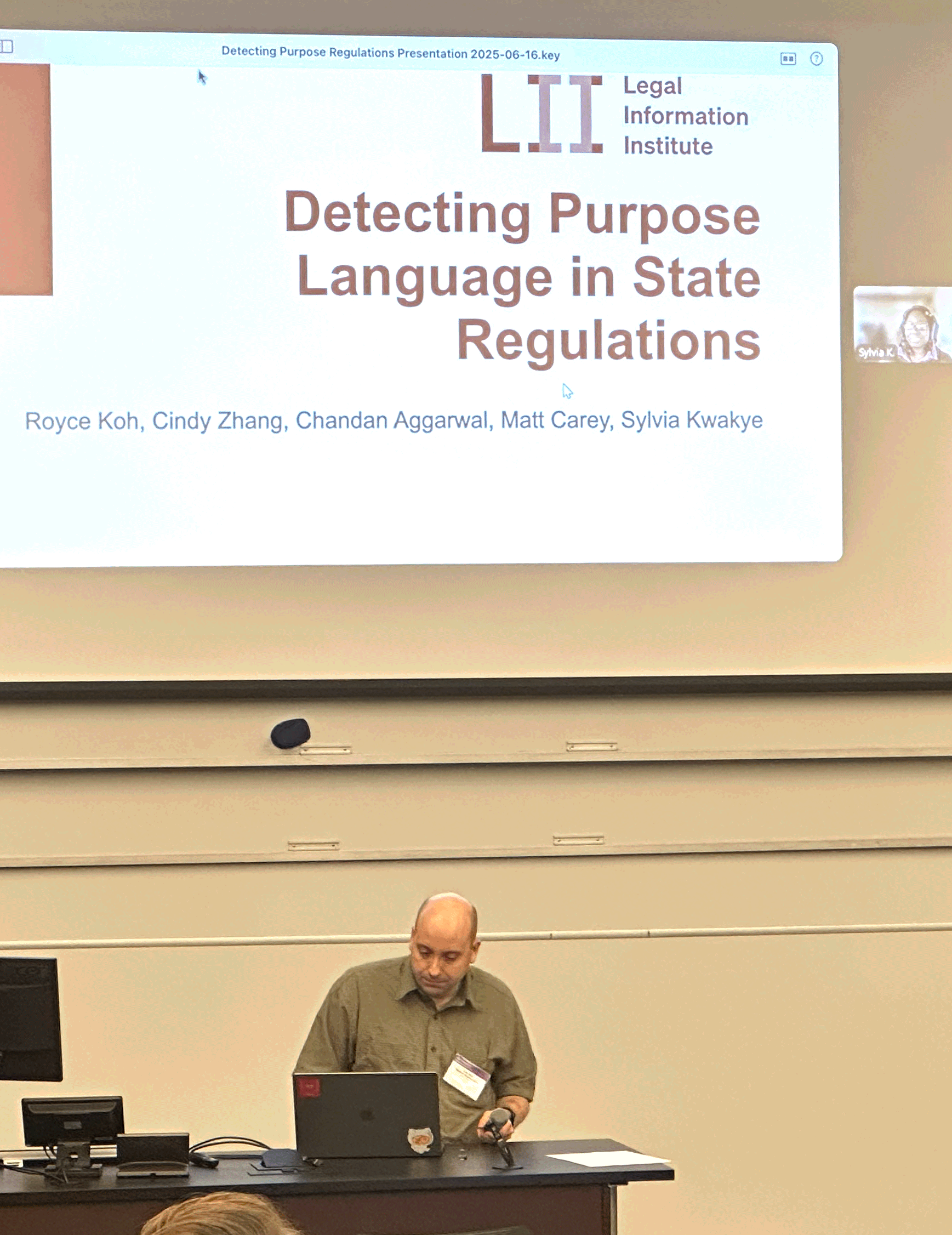
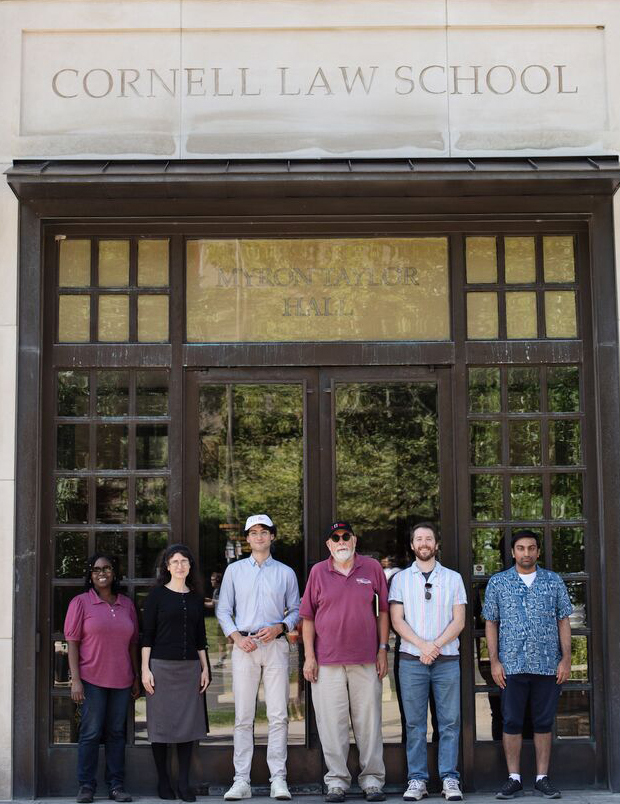
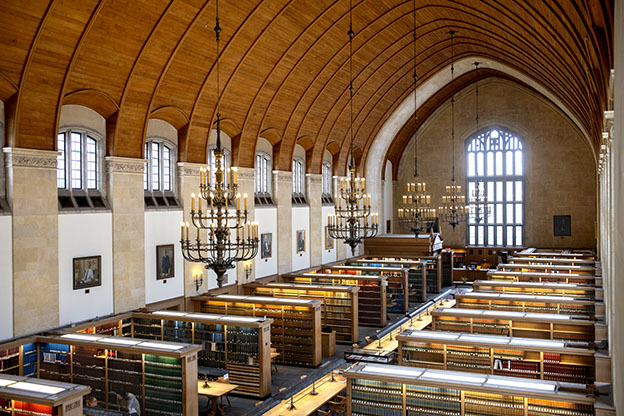
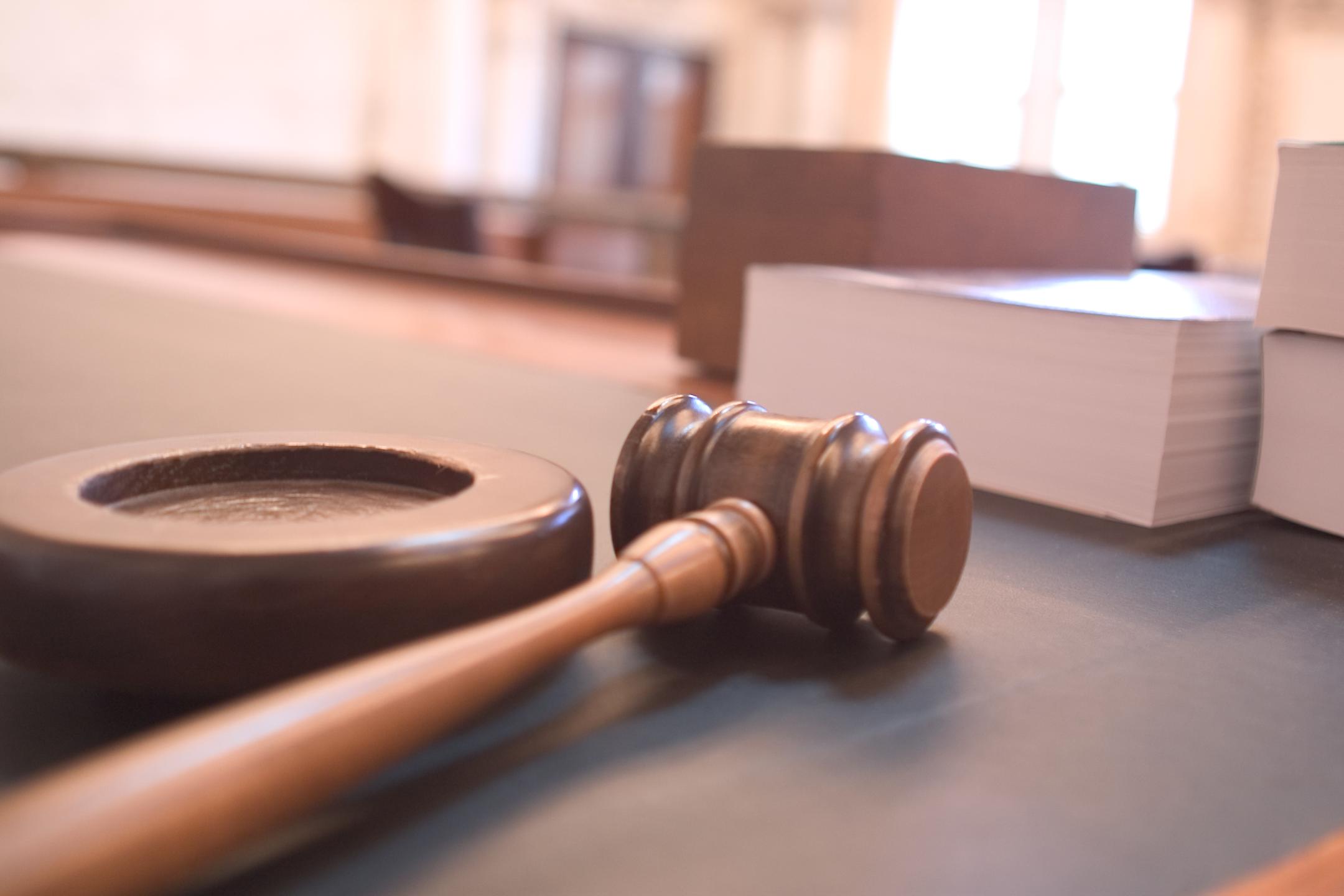
International Impacts:
With input from, and credit to, their fall semester M.Eng. students, and building on that work for the rest of the academic year, Dr. Sylvia Kwakye and Matt Carey placed a paper and gave a presentation in the Automated Semantic Analysis of Information in Legal Texts (ASAIL) workshop at the International Conference on Artificial Intelligence and Law (ICAIL) conference. They presented the paper as part of a session on Structure and Explainability in Legal AI.
Earlier in FY25, Co-Directors Sara Frug and Craig Newton attended the Law Via the Internet Conference (LVI), where Craig presented on U.S. litigation regarding AI and copyright and Sara presented on accessibility and visual law. The conference also incorporates the annual meeting of the members of the Free Access to Law Movement (FALM), the group that formed from the Legal Information Institutes inspired by Tom Bruce and Peter Martin’s work starting in the early 1990s. LII also supports FALM by hosting the Journal of Open Access to Law and through Sara’s service on that journal’s editorial board. In FY25, that work particularly included establishing permanent digital identifiers for the journal’s content.
We were also pleased to support open access on the international level by hosting an extended visit from German Ph.D. student Olcay Aydik. Olcay has dedicated himself to improving public access to the law in Germany. LII staff, along with Director Emeritus Tom Bruce, taught him all he could ever want to know about the challenges of publishing legal information in an evolving technology environment , both historically and today. Perhaps someday we will see Olcay at one of these international conferences representing a newly-formed German LII!
Regional Impacts:
Closer to home, LII remains mindful of its important role in fulfilling Cornell’s land grant mission to serve the people of New York. For example, Nichole McCarthy serves as the Parliamentarian of the Association of Law Librarians of Upstate New York (ALLUNY), a local chapter of the American Association of Law Libraries (AALL). Nichole also served on the planning committee for the ALLUNY Spring Institute at Syracuse University in April; and, she wrote about the experience for the ALLUNY newsletter. The conference theme was “Finding Future Law Librarians: Promoting the Profession, Mentoring, Networking, Hiring.” Attendees, both in-person and online, explored recruitment, mentorship, and the evolving identity of the profession.
Even closer to home, LII was proud to “sponsor” the Ithaca High School mock-trial team so that they could gain weekend access to the Moot Court Room for trial rehearsal prior to their spring competitions.
Online Impacts:
We are proud to report that educational institutions, news outlets, nonprofit organizations, and all branches of federal, state, and local governments continued to entrust us with their readers by linking to our resources. Although much has changed (our top referrer this year was ChatGPT, with Perplexity, Gemini, and Microsoft Copilot all ranking among the top 20), we were pleased to see continued referrals from long-standing traffic sources like Wikipedia, Google, and Microsoft.
Traffic continued to track the news, with top pages including the Wex articles on due process, defamation, habeas corpus, and Chevron deference. We were especially pleased to see referrals from news outlets including the Associated Press, the Washington Post, CNBC,Time, Newsweek, and Vox, and from social media across the political spectrum. The U.S. Department of Justice, the Administrative Office of the U.S. Courts, and the Library of Congress referred their users, as did the governments of California, Ohio, and Arkansas. Most encouragingly, learning management platforms such as Canvas, Blackboard and Google Classroom, as well as library guides from dozens of higher education domains trusted us as a reliable reference source for their students.


